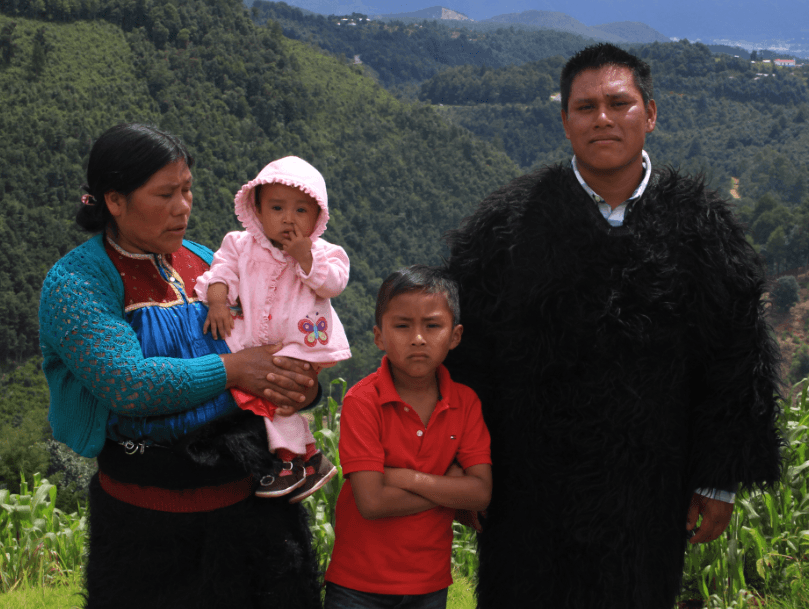
Romeo waited outside after taking his wife, Susana, to the emergency room at the San Cristobal de las Casas during his daughter’s delivery. Two days later, they brought him her corpse and a dirty baby. They did not offer any explanation. They did not explain that Susana was not treated immediately, that she was left naked in a hospital bed in front of all patients and hospital staff, that they removed her gallbladder without her consent and that, after her death, they took her fingerprint to falsify her authorization of the surgery.
The death of Susana cannot remain unpunished. No woman should suffer what she went through. No family should face what her family is facing. The Mexican State must offer reparation of damages and the San Cristobal Women’s Hospital must be safe for women.
One Hospital for 18 Municipalities
The San Cristobal Women’s Hospital – where Susana died – provides services to 18 municipalities in the Altos region of Chiapas, which form part of the San Cristobal de las Casas Health Jurisdiction No. II. The municipalities include: San Cristóbal de las Casas, Aldama, Amatenango del Valle, Chalchihuitán, Chamula, Chanal, Chenalhó, Huixtán, Larráinzar, Mitontic, Oxchuc, Pantelhó, Tenejapa, Teopisca, Las Rosas, Zinacantán, San Juan Cancúc, and Santiago El Pinar.
According to the 2010 Population and Housing Census, in the Altos region of Chiapas, there are 310,774 (Source) women, of which 204,658 are over 12 years of age. It is estimated that 82,217 of these women do not have any kind of healthcare coverage.
Of the women that died in Chiapas during 2012: • 1 out of 10 was under 19 years of age. • 1 out of 4 had universal public health insurance. • 7 out of 10 died in a health clinic or state or federal hospital. • 8 out of 10 received some kind of medical care before her death. • 1 out of 3 had received prenatal care during the first trimester of their pregnancy.
The Case's Timeline
- October 2013
-
Susana is Admitted to the Hospital
October 4th
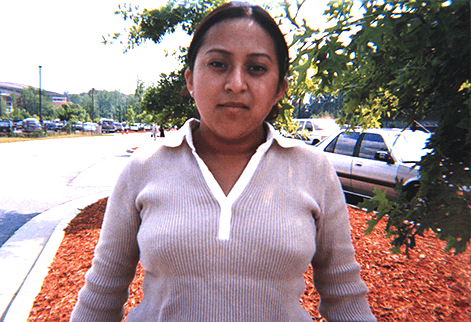
Susana, a 26-year-old indigenous Tzotzil woman, 39 weeks pregnant, arrives at the emergency room of San Cristobal de Las Casas Women’s Hospital. Susana is accompanied by Lucía, her mother-in-law, who is discriminated against by the medical staff for not being able to speak Spanish. The healthcare personnel force Lucía to leave the hospital because she is indigenous. While Susana is hospitalized, she is kept naked, exposed on the hospital bed to all emergency personnel and other patients.
-
The Hospital Does Not Provide Care or Information
October 5th
Susana does not receive medical treatment. The family waits outside the hospital, ignorant of Susana’s condition.

-
Susana Dies; Her Daughter Survives
October 6th
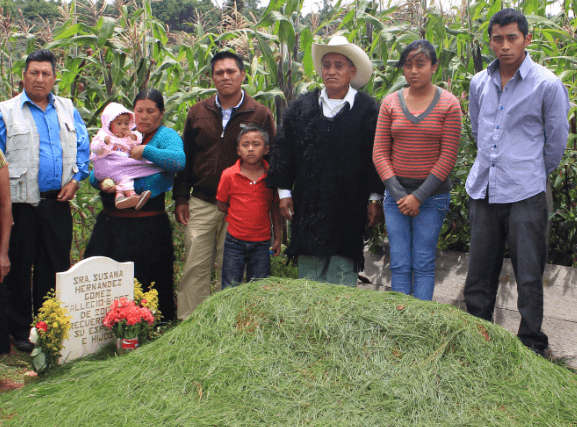
The family continues to wait outside without knowing anything about Susana’s condition. Susana undergoes two operations, a cesarean and a gallbladder operation, without her informed consent nor that of her family. The family is informed about the birth of Susanita and the death of Susana. The medical personal hand over Susana’s corpse without a death certificate. The medical personal hand over the newborn, violating protocols: she has not been washed and they do not offer instructions on proper feeding and care. During the night, the newborn has problems breathing and a fever. The family takes the newborn to a private hospital in San Cristobal de las Casas for medical treatment.
-
Susanita Improves
October 7th
Susanita, the newborn (who is now almost 1-year old), is discharged from the private hospital.
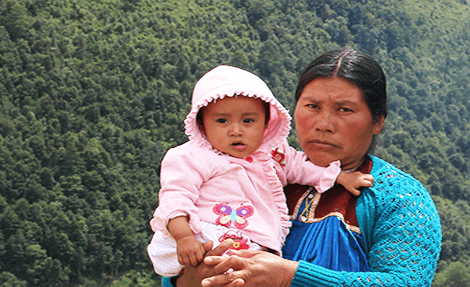
-
GIRE Defends the Case
October 10th
El Grupo de Información en Reproducción Elegida AC (GIRE) contacts the family and begins legal case support and defense.
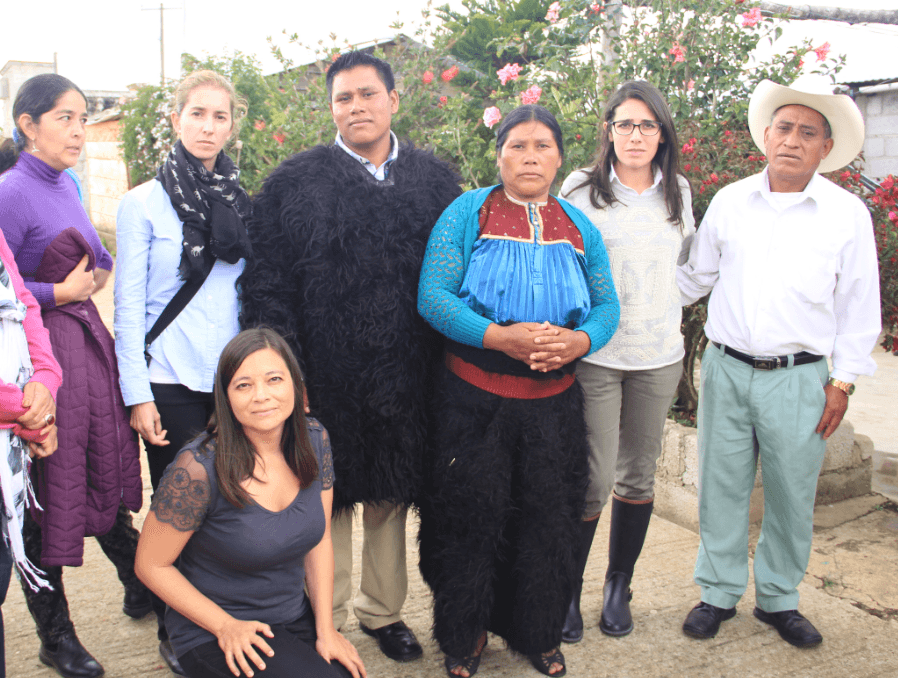
-
The Family Files a Complaint with the NHRC
October 15th
Manuel, Susana’s father, and Romeo, her husband, present a complaint with the office of the Fifth General Inspectorate of the National Human Rights Commission (NHRC) in San Cristobal de Las Casas.
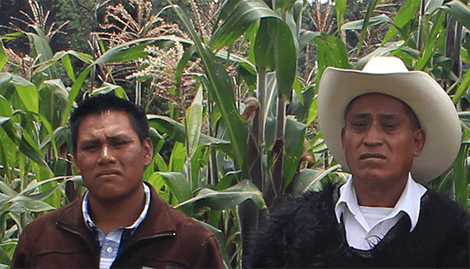
-
The NHRC Accepts the Case
October 31st
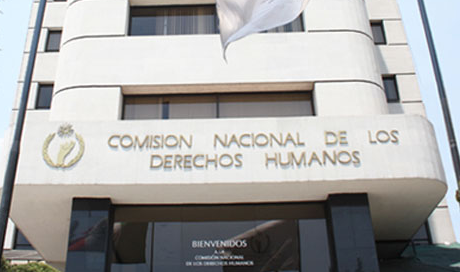
The NHRC admits the complaint.
- February 2014
-
GIRE Presents Additional Material to the Complaint
February 19th
GIRE presents additional material to the complaint and a technical opinion on the case presented to the NHRC.
- March 2014
-
It Could Have been Prevented
March 15th
The Safe Motherhood Committee in Mexico develops and submits a technical medical opinion that the situation could have been prevented.
- May 2014
-
The NHRC Reassigns the Case to the Chief Investigator
May 22nd
The complaint was reassigned to the Fourth General Inspectorate without notifying the family or GIRE, as legal representative.
- July 2014
-
NHRC Issues a Recommendation
July 17th
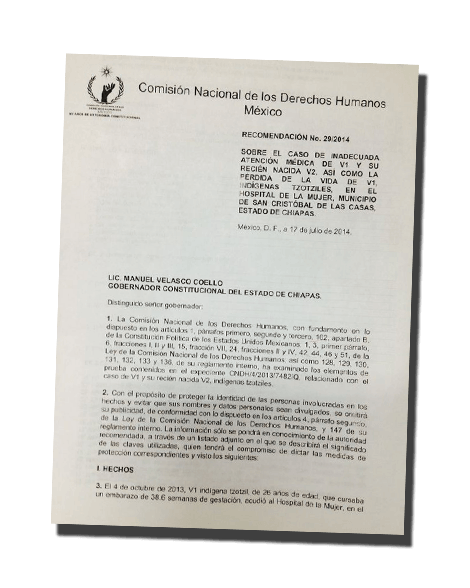
Nine months after Susana’s death, the NHRC emits its recommendation on the case, again without notifying the family or GIRE, as legal representative. The NHRC did not respond to the family’s specific requests and the recommendation is generic, ignoring the case’s specificities.
- August 2014
-
The NHRC's Failure to Notify
August 1st
Two weeks after issuing its recommendation, the NHRC notified Romeo, Susana’s husband. GIRE, as legal representative, has still not received any official notice.
-
Governor Accepts the Recommendation
August 7th
Manuel Velasco, the Governor of Chiapas, accepts the NHRC’s recommendation. He has six months to comply.
NHRC
Petition
Sign the petition demanding that the Chiapas government publically apologize to Romeo and his children and that the State guarantee dignified, quality and timely medical care for women in Chiapas.
The image of Chiapas as “paradise” in the government’s tourism campaigns is only a reality for a small group of people. The slogan, “Vive Chiapas!” only applies to tourists, not the people who live there. For many women in the state, “Chiapas, Adrenaline for Living!”, yet another government publicity slogan, really means circumventing death while receiving medical care for during pregnancy, birth and postpartum.
"Be passionate about Chiapas” is yet another slogan, after which we have placed a question mark to call into question just how “passionate” the government is for women’s reproductive health and rights.
Justice for Susana's family will only happen if the following are achieved:
A Dignified Hospital with Trained Personal
The family requests:
That all pregnant women are guaranteed the right to health, and provided with quality and timely medical care in Chiapas, through the effective implementation of reproductive health programs that take into consideration women’s cultural background and have sufficient state financing.
The Recommendation Issued by the NHRC Notes:
Instructs the involved party to publish a memo for all San Cristobal de las Casas Women’s Hospital medical staff, dependent on the Chiapas Ministry of Health, to submit copies of their certification and recertification processes conducted before the Board of Medical Specialties. The purpose of said documents is to ensure sufficient continuing education, experience and knowledge to maintain the necessary skills to provide adequate and professional medical services. These records of evidence will prove compliance.
Instructs the involved party to ensure that the public servants who provide services in Chiapas’ Ministry of Health clinics, hospitals and health centers, adopt effective preventive measures to ensure that clinical records on the medical care that was provided, are properly filled out and protected in accordance with the established national and international law, as well as the corresponding Official Mexican Norm and sent to the National Commission’s records to accredit their fulfillment.
Medical and Psychological Care
The family requests:
That the State offers free education for Susana’s two small children until they turn 18. In addition, the State should cover medical and psychological care to ensure the children’s comprehensive physical and mental wellbeing.
The NHRC omitted this point in its recommendation.
Investigation and Sanctions for those Responsible
The family requests:
That the medical personal who participated in the negligent care provided to Susana Hernández Gómez be punished to ensure that similar events do not happen again.
The NHRC recommends:
a) Ample collaboration with this national organism for the presentation and follow-up to the charges filed before the Chiapas Attorney General’s Office so that, to the extent of their competence, the preliminary investigation begins, corresponding to the victim’s rights, and that they send records detailing their compliance to the National Commission,
b) Ample collaboration with the National Human Rights Commission during the process of filing an administrative complaint to begin disciplinary procedures under the Internal Affairs Department of the Chiapas Ministry of Health, given the points considered in this recommendation and evidence required.
Training and Awareness Raising
The family requests:
Awareness raising and training on women's rights, including reproductive rights, for healthcare personnel, to prevent similar situations from occurring in the future.
The NHRC recommends:
That comprehensive education and training programs in human rights are designed and implemented in Chiapas Ministry of Health clinics, hospitals and health centers so that the legal framework recognizes women and children, guaranteeing dignified treatment and recognizing the vulnerable situation that many diverse groups encounter as members of indigenous peoples and communities and, that the National Commission receive the program indicators and evaluation applied to trained professionals, and any other records that demonstrate compliance.

